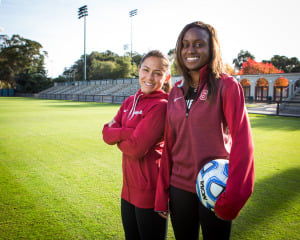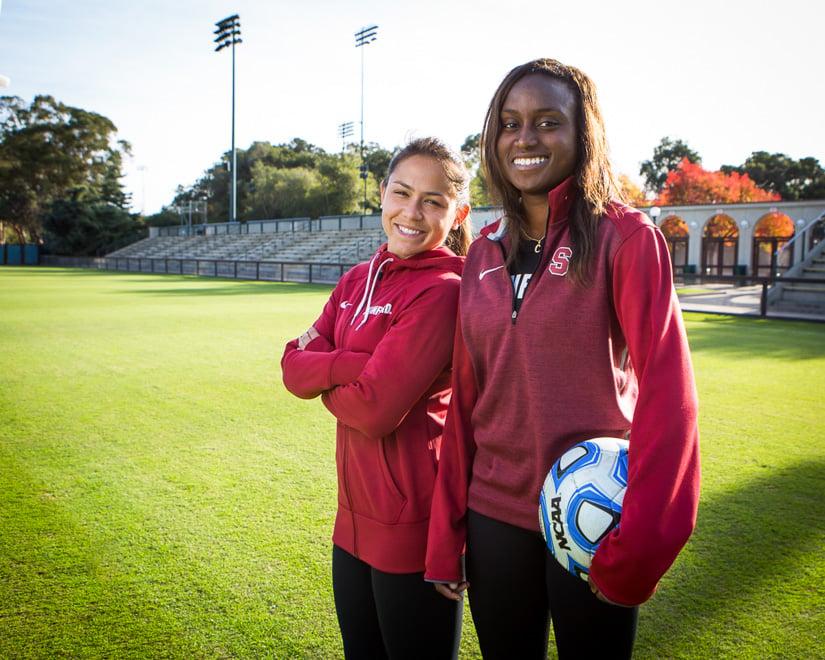Heading into the NCAA women’s soccer tournament, the Stanford women’s soccer team continues to work tirelessly to accomplish its singular goal: emerge as champions. Staff writer Elizabeth Trinh of The Stanford Daily sat down with senior midfielder/forward Lo’eau LaBonta and senior forward Chioma Ubogagu to reflect on their Stanford soccer experiences.
The Stanford Daily (TSD): How did you get started in soccer, and what influenced you to continue to play?
Lo’eau LaBonta (LL): When I was young, my dad put me in all the sports. I literally played basketball, baseball and soccer. I just always fell for soccer first, so I just stuck with it. My dad is the one who always told me to work my hardest in all my sports, and he was the one at all my practices and all my games, so he’s the one who’s always had me stick with it, and he showed just as much passion, so I think he was the one who kept me working. Growing up, Mia Hamm and Julie Foudy were always my influences.
Chi Ubogagu (CU): I was born in London, England, and soccer is huge there, or football, as they call it. My brothers played for their schools, and they’re both older than me. I always wanted to do whatever they were doing, so I never really played with dolls, never really hung in the house. Every time they got back from school, I would just follow them around and try to kick the ball.
TSD: In 2011, your freshman year, the Stanford women’s soccer team was the NCAA champions. With that being said, what makes this current team different from that team?
LL: Well, that team had a bunch of standout players, of course the seniors were crazy amazing, but I know they were trying to focus on a bunch of players who got the goals and the assists – but I think this team is more of a team than that team was. We fight for each other. When we celebrate our goals, it’s as a team. We don’t really have individual celebrations for every girl. We’re total girls; we run together and hug each other and scream, so I think this team, as a whole, has all bought in – from a redshirted freshman that’s on the bench to a senior that’s about to graduate.
If you haven’t read Graham Hays’ ESPN feature on Lo LaBonta and her father, please do so. It’s amazing: http://t.co/5OcxQDtACX
— Stanford Soccer (@StanfordWSoccer) November 17, 2014
CU: The personnel is different, for sure. We have a lot of younger people on our team, and they’ve made a great impact, and they’ve done a great job of buying in and just totally having a great work ethic to achieve our two goals. We set two goals at the beginning of the year. They were to win the Pac-12 championship, which fell a little short, and to win the national championship. Everyone immediately bought in, and the team chemistry was great, and everyone was just really competitive and ready to fight for it.
TSD: With this season being the last of your Stanford soccer career, what are you looking to accomplish by the end?

LL: My personal goal is the same as everyone else’s goal on this team, which is to win that national championship. It was first to win the Pac-12 championship, but unfortunately, with our loss to UCLA, we weren’t able to achieve that – but we are just in as good of a position to win that national championship, so that’s obviously my number one goal.
CU: By the end of this season – I hope my team, by early December, is holding a national championship trophy. That’s what we really, really want; that’s what our coach and staff want. It’s what we’ve worked really hard – not just the preseason, but also the off-season – to put in a lot of hours to try to achieve that goal, so I hope it pays off.
TSD: What has been your most cherished soccer memory of this season?
LL: One of the most memorable, for sure, would be that first game against UNC when Chi scored the overtime goal to end the game. It was the first time in Stanford’s history ever beating North Carolina, so once that happened, the bench cleared, and our team all ran out to her, and we just piled together. We were screaming because we were so happy, and it was such a great way to start off the season. I think a lot of people doubted us in the beginning, and when we came out with that W, people started to believe in us, and then our team all believed in each other. It just set off a great season.
CU: So our first game of the year was at Chapel Hill against UNC, one of our biggest rivals because we have never beaten them in the history of our program. We went to their place and got a win. I just remember how excited everyone was – it was such a great start to the season – and how pumped our coach Paul Ratcliffe was. I had never seen him like that, genuinely excited. It’s definitely a moment I’ll remember after I leave Stanford.
TSD: This is your final season with these girls. If you could impart lasting words of wisdom to your teammates, what would they be?
LL: With this team, we just had a great team get-together, and we all just let out our favorite moments, but I would just say that I love this team with all my heart – every individual. These girls are all my friends, my sisters, my teammates, and they’re out here everyday working just as hard as I am. At the end of this, I would say thank you to all my seniors and to my teammates for an amazing year to go out with. This was one of the best years in my life.
CU: This has been an incredible season. I remember our senior game, how they [my teammates] decorated our locker room, and it was amazing to see how everyone cared. You felt the camaraderie, and it was really special. I’m definitely going to miss this group of girls. We just have so many funny moments, so many different personalities on the team that make me laugh all the time. Sometimes at practice, I won’t even talk because I am listening to all these different conversations, and it’s hilarious. It’s just the little things like that, our bus rides, team dinners, where you can’t pinpoint one exact thing that happened, but just being around a group of your best friends, I’ll miss that. The game is always fun; the game is meant to be fun. It’s something that you love, and hopefully everyone’s passion stays with them through the problems that arise and the losses and the doubts.
Contact Elizabeth Trinh at entrinh ‘at’ stanford.edu.
